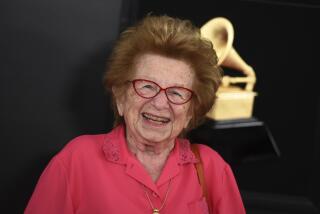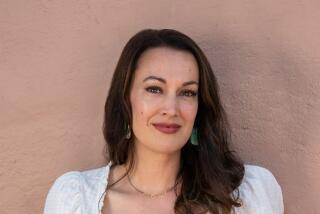STAGE REVIEW : Ladies of the ‘80s : Theater: Wendy Wasserstein’s ‘Heidi Chronicles’ is a dated look at the dashed expectations generated by yuppie feminism.
- Share via
“I feel stranded,” says art historian Heidi Holland, talking to a group of alumnae from Miss Crain’s School, “and I thought the whole point was that we wouldn’t feel stranded. I thought the point was that we were all in this together.” In a nutshell, or a phrase, that’s what “The Heidi Chronicles” is all about: feeling stranded in the ‘80s.
Except that this is the ‘90s, and the Pulitzer Prize-winning Wendy Wasserstein play that opened Sunday at the James A. Doolittle Theatre addresses itself chiefly to one generation and one gender: the baby-boomer feminists of the preceding decade who wanted it all--the career, the man, the kids--but got stuck finding a way to get it.
It is at once the play’s focus and its limitation. This is Wasserstein’s least concealed work to date--a candid avowal of failed expectations. The emotions stem from a center of deep disappointment. Whether you buy it will depend on how realistic you think those expectations ever were--or care.
Wasserstein is savvy enough to offer a journal, not a remedy. “The Heidi Chronicles” relies heavily on that last word, chronicles . We watch art historian Heidi watching herself and her friends and lovers achieve levels of success and lead unfulfilling urban lives--from her gay pediatrician buddy, Peter Patrone, as genuine and sad in his own way as she is in hers, to her once-flame, Scoop Rosenbaum (“he’s a creep, but he’s a charismatic creep”), who speaks in buzzwords and has a habit of grading everything (“(Eugene) McCarthy is a C+ Adlai Stevenson”).
Nothing much happens here.
We attend baby showers, wedding receptions, power lunches and at least one absurdist TV show. We share with Heidi the resounding emptiness of that intense activity--that mad pursuit of15 minutes of celebrity in which the celebrants mostly make fools of themselves.
Even as the curtain falls, Heidi, the uncommon woman of “Uncommon Women and Others,” the grown-up Janie Blumberg of “Isn’t It Romantic” who overcame Mommyphobia and set out to find parity and happiness, is still searching for her share of self-fulfillment. Her newly adopted baby daughter sleeping in the next room is her hope. It’s as close as she gets.
“Chronicles” is Wasserstein’s angriest play, and perhaps because of that, it is the men in it who are most clearly defined. Scoop, played by a not-always-charismatic Mark Harelik, is one of those philandering cads you love to hate.
The wife he settles for is a decidedly unliberated creature. With the exception of Heidi’s outspoken friend Susan (Mimi Lieber), who waits until Act 2 to join the legions of the shallow, the women come across as a pack of giddy, vain, ambitious creatures, sufficiently interchangeable to be played by two actresses, Maggie Baird and Elaine Hausman.
“Chronicles,” in fact, is really a play for 3 1/2 characters. And until she drops her facade in that fateful speech before the Miss Crain’s School alumnae, Heidi herself is enigmatic--particularly at the frosty hands of Amy Irving, who makes her seem unattainable as well as merely removed.
Until the final, gentler scenes, we know her less well than either Scoop or Peter, the other two developed characters. Of the three, Peter seems the most whole, and Robert Curtis-Brown plays him that way--as a clear-headed man who does not suffer fools. Dignity and a sharp wit are his substitutes for happiness. And his defenses.
Dan Sullivan’s direction seems needlessly cramped by Thomas Lynch’s uninspired triangular set, well lit by Pat Collins. The play’s reflectiveness may also be part of the hindrance. Its ideas go only so far. In addressing such a narrowly defined group--white, middle-class, urban yuppies, with an edge on the undelivered promises of ‘80s feminism--cogitation is limited. The play’s signature song could well be “Is That All There Is?”
As a further installment in Wasserstein’s body of work, “Heidi Chronicles” has some value. But it’s a period piece in imminent danger of losing relevance. Its quandaries are not that new, intense or important. And in the shadow of potentially more catastrophic concerns for the ‘90s, they seem slightly anemic.
Wasserstein is better when she sticks to funny--partly because the issues she writes about can’t sustain heavy treatment and partly because she’s a genuinely gifted comic writer who’s terrific at wrapping her pain in her humor.
What “Heidi Chronicles” could become, however, is a good movie. It’s already there in structure and form, and Wasserstein is working on the screenplay. Deep down, that’s what it really wants to be.
At 1615 N. Vine St. in Hollywood, Tuesdays through Saturdays, 8 p.m.; Sundays, 7 p.m., with matinees Saturdays and Sundays, 2 p.m. Additional matinees Thursdays, 2 p.m., beginning Nov. 8. Ends Dec. 23. $29-$40; (213) 410-1062, (714) 634-1300.
More to Read
The biggest entertainment stories
Get our big stories about Hollywood, film, television, music, arts, culture and more right in your inbox as soon as they publish.
You may occasionally receive promotional content from the Los Angeles Times.










